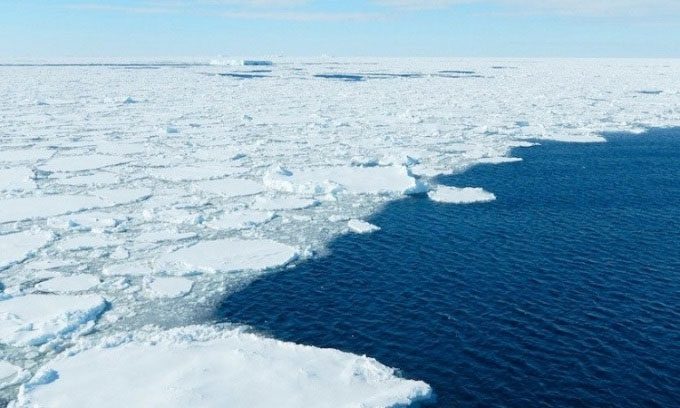The frigid winter temperatures in Antarctica contrast sharply with the heatwave trends in other parts of the world, marking the fourth hottest summer on record.
From April to September 2021, a research station in the Antarctic highlands recorded an average temperature of -61 degrees Celsius. This is the coldest temperature recorded since 1957, 2.5 degrees Celsius lower than the 30-year average. The previous record for the coldest winter was -60.6 degrees Celsius in 1976, as reported by journalist Stefano Di Battista. The Washington Post confirmed this record with Richard Cullather, a research scientist at NASA’s Global Modeling and Assimilation Office.

Sea ice in Antarctica. (Photo: Hannah Zanowski/University of Washington)
The extreme winter temperatures are likely the result of a strong polar vortex in the stratosphere, the second layer of the Earth’s atmosphere from the surface. “Basically, the winds in the polar stratosphere become stronger than usual, coinciding with the jet stream gradually shifting towards the poles,” said Amy Butler, an atmospheric scientist at the National Oceanic and Atmospheric Administration (NOAA). “This causes cold air to be trapped over Antarctica.”
Additionally, the strong polar vortex leads to greater ozone depletion in the stratosphere, further intensifying the polar vortex. Ozone, composed of three oxygen molecules at high altitudes in the atmosphere, protects the Earth’s surface from harmful ultraviolet rays. The loss of ozone can cause the ozone hole to expand over Antarctica.
Thanks to the frigid temperatures, sea ice levels around Antarctica were at the fifth highest on record in August. However, the ice melted rapidly in the following weeks. By the end of September, sea ice had thinned to its lowest levels. Scientists indicate that the climate in Antarctica is changing rapidly, and the extreme winter temperatures do not mitigate the impacts of climate change.
Winter temperatures in Antarctica stand in stark contrast to trends in other parts of the world. July 2021 was recorded as the hottest month in history. “A cold winter is interesting but does not change the long-term warming trend,” emphasized Eric Steig, an atmospheric scientist at the University of Washington. In the long run, like the rest of the world, Antarctica is warming, with sea ice rapidly declining.


















































